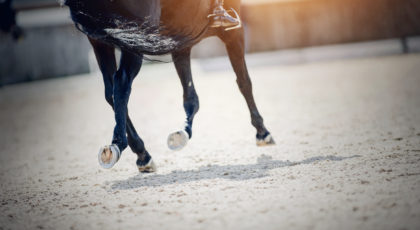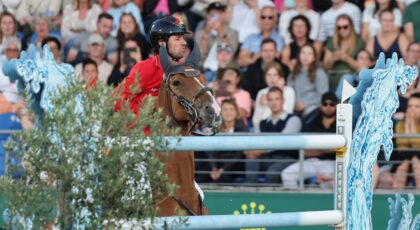This is the second installment of “UK versus North America,” which I’ve just deemed a mini-series.
Last time, I started the post discussing whether you keep your horse at livery or you keep your horse boarded. I ended the post stating you can go the yard or go to the barn but rarely, if ever, the barnyard.
Let’s carry on from there and assume that since you’ve arrived at the yard or barn, you might as well ride, but are you going to ride in the manége or the ring? Tough choice.
Manége
A manége is what the Brits call a riding ring. The word came about in the 1600s and derives from the Italian word maneggio, which means “handling or training a horse.” Maneggio comes from manegggiare, which means “to control” but the French changed it to manége, and that is how we ended up with a weird word for arena or riding ring.
I should mention that the above word is not related to menagerie, which is a collection of animals held in captivity for our “viewing pleasure” or the more risqué ménage à trois, as you will see the A and E are switched. I just think it’s important to know the distinction.
Arena
It won’t surprise you to learn the word arena comes from the Latin word harena meaning “a place of combat.” What is surprising and a little gross is that the original meaning of the word was “sandy place.” Why is that gross? Because sand was used in places of combat such as Roman amphitheatres to soak up all the blood. Ergo, the meaning changed from “sandy place” to “place of combat.”
If you look up the French and Italian words for sand, you will find they closely resemble that of arena. And if you look up the Spanish word for sand you will find the word is arena. That was an unexpected twist, I admit, but at least I understand why we call it an arena, combat aside.
Ring
The word ring in the sense that people gather around while two men beat each other to a pulp or squabble on the ground for reasons unknown has been around since the 1300s. The basic and paraphrased meaning is “bystanders gathered forming a ring of sorts to watch a fight.” And I suppose that is how we now have a riding ring.
I will say that I don’t care for the fact that arena and ring have to do with combats while a manége has everything to do with horses, nevertheless.
Moving on
Now that your ride is done it’s time to plait your horse, or perhaps you’d rather braid. Either way, you’re doing the same thing, but rarely, if ever, for fun.
This took more research than I was prepared for. If you’re in the UK, you’ll plait your horse while those of us in North America will braid. The tricky thing about deciphering the difference between these two words is that, according to my sources, the words are presented as though they are interchangeable, which they are, but isn’t helpful for my quest for clarity especially since we hold steadfast to our word of choice.
Plaits
What I did eventually learn is that plait is the noun form of the verb pleat. Though both words are happy to be either a noun or a verb. No reason why things should be simple.
Both words have been around since the mid-1500s. Pleat means “a fold” or “to gather in folds” while plait means “to fold” or “gather in pleats” or “to weave or braid.” The subtlety is enough to do your head in. Plait comes from the Latin plicare “to fold” and the past participle of plicare is plicatus “to lay, fold, twist,” which all lines up rather well with how we view the word today.
Braid
Now this is where things get frustrating. When looking in either my Penguin or Oxford dictionary it tells me the definition for braid is “to plait (the hair),” which isn’t remotely helpful.
This word derives from the Proto-Germanic bregdanan meaning “make sudden jerky movements from side to side.” Sort of like how Napoleon rode his horses. (To get the joke, read the post I wrote about him.) Anywho, the word survived in similar forms through the centuries and by the time it reached Old English it had dropped the “an” and turned into bregdan, and its meaning expanded to include “move quickly, pull, shake, swing, throw (in wrestling), draw (sword), bend, weave, knit, join together, changer color, vary; scheme, feign, pretend.”
And here we are, some years later, with the word braid meaning “to plait.” I wonder what happened to all the other meanings during the centuries leading to now?
Headcollar
When it comes time to plait and/or braid your horse, the first thing you’ll do if you are from the UK is put on their headcollar but if you’re from North America you’ll put on their halter.
The former, honestly, just makes sense. It’s a collar we strap onto our horses’ heads.
The word collar comes to us from the Latin collare meaning “necklace, band or chain for the neck” and the Latin word for neck is collum, which falls nicely into place. By the time the 1300s rolled around the word collar meant “border at the neck of a garment, band put around the neck of a dog or other animal for purposes of restraint or identification.” And when the 1400s hit, the meaning “neck-band forming part of the harness of a horse or other draught-animal” was added to the definition.
I won’t belabor head. In fact, all I’ll say is that this word comes to us via the Old English word heafod meaning “top of the body, leader or ruler and/or upper end of a slope.”
Headcollar is the obvious choice to call what we put on our horses when we want to lead them about. I don’t know what we were thinking with halter. But we’re about to find out.
Halter
This word has come to us from all sorts of languages such as the Old English word hælfter meaning “rope for leading a horse,” the Old High German word halftra meaning “that by which something is held” and the Old Saxon word haliftra meaning “halter.”
I suppose we just liked the word halter more than headcollar. Why not?
It’s Odd
It’s odd to me that we use such different words meaning the same thing, especially in the niche world of horses. Yet here we are and here we shall remain.
Sources:


 November 7, 2023
November 7, 2023 

























